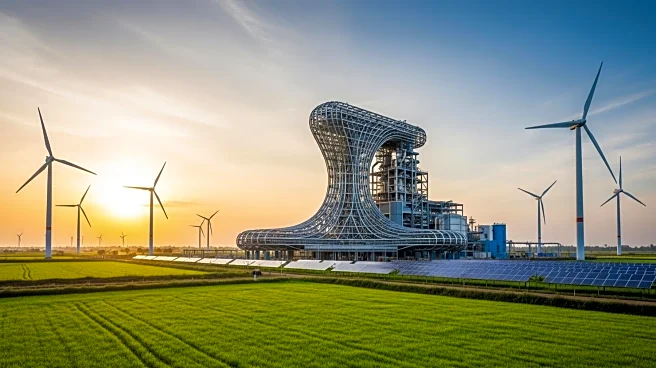What's Happening?
Mukand Sumi Special Steel Limited (MSSSL), a joint venture between Bajaj Group and Japan’s Sumitomo Corporation, has announced the construction of a new greenfield integrated steelmaking facility in Kanakapura, Karnataka. The plant, which represents an investment of Rs 2,345 crore, aims to expand MSSSL's production capacity to 7 lakh tonnes per annum. The facility is designed to be a sustainability-first plant, adhering to a zero liquid, solid, and gaseous discharge model, with over 95% of its energy needs met through renewable sources. The project is a significant step towards MSSSL's commitment to achieving net-zero steel manufacturing by 2050. The plant will feature hydrogen-ready infrastructure and carbon capture technologies, and is expected to begin operations by early 2028. It will include facilities for iron making, steel making, and a blooming mill, focusing on flexibility, automation, and digital integration to optimize energy use and ensure consistent product quality.
Why It's Important?
The announcement of the new plant underscores a significant shift in the steel industry towards more sustainable practices. By integrating renewable energy and advanced technologies, MSSSL is setting a precedent for environmentally responsible steel production. This move is likely to influence other players in the industry to adopt similar practices, potentially leading to a broader transformation in manufacturing processes. The investment also highlights the growing demand for steel and the need for increased production capacity to meet this demand. The plant's focus on sustainability aligns with global efforts to reduce carbon emissions and combat climate change, making it a critical development in the context of environmental policy and industrial innovation.
What's Next?
As the project progresses, MSSSL will likely engage with various stakeholders, including government bodies, environmental groups, and industry partners, to ensure the successful implementation of its sustainability goals. The integration of hydrogen-ready infrastructure and carbon capture technologies will require collaboration with technology providers and experts in these fields. Additionally, the plant's development may prompt regulatory reviews and approvals, particularly concerning environmental impact assessments. The industry will be watching closely to see how MSSSL's approach influences market trends and regulatory frameworks, potentially setting new standards for steel manufacturing.
Beyond the Headlines
The establishment of a sustainability-focused steel plant could have long-term implications for the industry, including shifts in supply chain dynamics and increased emphasis on green technologies. It may also drive innovation in related sectors, such as renewable energy and carbon capture, fostering new business opportunities and partnerships. The plant's success could serve as a model for other industries seeking to balance economic growth with environmental responsibility, contributing to broader societal shifts towards sustainable development.









